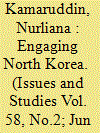|
|
|
Sort Order |
|
|
|
Items / Page
|
|
|
|
|
|
|
| Srl | Item |
| 1 |
ID:
185902


|
|
|
|
|
| Summary/Abstract |
The assassination of Kim Jong Nam in 2017 brought about a significant change in the diplomatic relationship between Malaysia and North Korea. Although diplomatic relations between the two countries were downgraded due to the incident, current changes would likely encourage the resumption of diplomatic ties. This study applies a poliheuristic decision-making analysis of Malaysia’s diplomatic relations with North Korea. It argues that Malaysia’s choice to establish diplomatic ties with North Korea was made consistent with the strong sense of neutrality that has shaped Malaysia’s foreign policy. Despite the increased security threat North Korea is perceived as globally, it was not until the assassination attempt that there was any regression in diplomatic relations between the two countries. Poliheuristic theory can also be utilized to explain why Malaysia will most likely proceed with reopening the Malaysian Embassy in Pyongyang as this is an alternative that would present Malaysia with continued gain in consideration of both its emphasis on diplomacy and neutrality in its foreign policy.
|
|
|
|
|
|
|
|
|
|
|
|
|
|
|
|
| 2 |
ID:
143895


|
|
|
|
|
| Summary/Abstract |
Good governance is an essentially contested concept. In Asian countries, economic efficiency and macro-economic projects have predominantly been pursued with the aim of promoting national, aggregate measurements of development. Hydroelectric power generation projects have played a central role in the national planning of several regional states as part of an attempt to achieve these goals. Even by their own terms of reference, however, hydroelectric power projects have at most a mixed record of success, and are increasingly criticized with regard to their negative impact on the environment, and upon vulnerable groups. The government of Malaysia has embraced the “developmental state” model, and this is best illustrated by governance initiatives and resource exploitation in the East Malaysian states of Sarawak and Sabah and their respective “development corridors”. Sarawak’s Corridor of Renewable Energy (SCORE) is the most visible sign of Malaysia’s macro-economic hydroelectric development focus, as Sabah’s corridor focuses on trade, investment, and tourism. This article takes a critical perspective towards good governance, emphasizing that it should function in the interests of all society, but in particular the most vulnerable. It therefore addresses the impact of Malaysian hydroelectric development policies on one of the most vulnerable sections of Malaysian society, the indigenous peoples of Sarawak. The findings cast doubt on the validity of continued prioritization of hydroelectric dam construction as a cornerstone of government energy and development policy.
|
|
|
|
|
|
|
|
|
|
|
|
|
|
|
|
| 3 |
ID:
192219


|
|
|
|
|
| Summary/Abstract |
This special issue discusses the roles played by two ‘middle powers’ in the Indo-Pacific region: Taiwan and South Korea. It examines their attempts to use regional policy to decrease their dependence on the great powers and thereby reduce their overall level of marginalisation and subordination. The two states find themselves navigating through a complex geopolitical landscape amid US–China rivalry while, at the same time, working to meet their own challenges in regional affairs. In recent years, both have aimed to diversify their relationships and expand their presence across the wider region with a ‘New Southbound Policy’ (NSP-T), in the case of Taiwan, and a ‘New Southern Policy’ (NSP-K), in the case of South Korea. Both policies are aimed at important neighbours, namely Southeast Asia and India, major recipients of Taiwanese and South Korean capital, technology, cultural influence and educational aid.
|
|
|
|
|
|
|
|
|
|
|
|
|
|
|
|
| 4 |
ID:
175408


|
|
|
|
|
| Summary/Abstract |
In 2018, Malaysia saw a change of ruling parties for the first time since its independence. Malaysian democracy however, remains monopolized by the ruling elites and dominated by a strong state. This paper looks at the multidimensional relations between state, economy and society that characterize the Malaysian democracy and is divided into five thematic sections. Firstly, the key characteristics of Malaysia’s state, society and economy are discussed. Secondly, the paper looks at some of the main historical and transformative features of Malaysia’s modern statehood including the colonial experience under the British, which institutionalized race-based politics as well as the government’s overhaul of its economic and social policies in response to conflict in the late 1960s. The third section looks at some major factors that shape the politics of Malaysia, specifically the factors that contributed to BN’s long hold on power. Section four of the paper looks at the major shifts in the relations between state, society and economy and its impact on Malaysian democracy. Finally, the fifth section assesses the challenges and prospect of the country since the change in ruling parties.
|
|
|
|
|
|
|
|
|
|
|
|
|
|
|
|
| 5 |
ID:
192223


|
|
|
|
|
| Summary/Abstract |
The Republic of Korea's New Southern Policy (NSP-K), introduced in 2017, and its New Southern Policy Plus (NSP-K+), introduced in 2020, were regarded as highlights of former President Moon Jae-in's foreign policy initiatives. Building upon the three pillars of ‘People, Prosperity and Peace', South Korea strengthened diplomatic and economic ties with the Association of Southeast Asian Nations (ASEAN) as part of its effort to elevate the organization as one of its main diplomatic partners. While the benefits of the NSP-K and NSP-K+ were very much focused on its external partners, the authors argue that the policy also elevated South Korea's middle power presence and ambition in the region, albeit with an unequal impact on various ASEAN member countries. This paper examines the concept of middle power and in doing so, looks at previous initiatives undertaken by South Korea in advancing its middle power strategy. It will then evaluate whether the NSP-K and NSP-K+ could be regarded as successful tools which contributed to enhancing South Korea’s middle power diplomacy and presence among ASEAN member states.
|
|
|
|
|
|
|
|
|
|
|
|
|
|
|
|
|
|
|
|
|